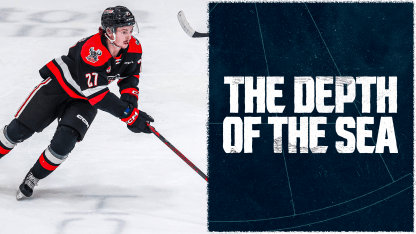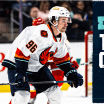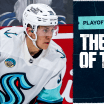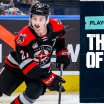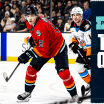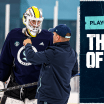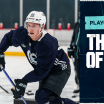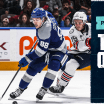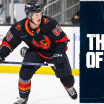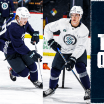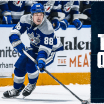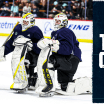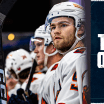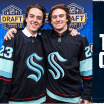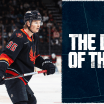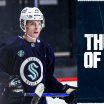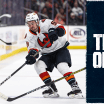Last winter, during the grind of the Western Hockey League major juniors schedule, Moose Jaw Warriors coach Mark O’Leary noticed his star player, Jagger Firkus, wasn’t his usual self. He pulled Firkus, the Kraken’s 2022 second-round draft choice at 35th overall, into whatever small, windowless room the visiting head coach is assigned at each road-trip arena.
“We were in Red Deer, I think,” said O’Leary, in his fourth year as Moose Jaw head coach after eight seasons as an assistant coach. “I called him in because I just felt like something was bothering him." It turned out Firkus was working through how best to assist a few teammates who were struggling.
Firkus has helped his teammates plenty during this season and over his time with the Moose Jaw franchise. He currently leads the WHL with 22 goals and 21 assists in 21 games for a team on the rise in the standings. That’s his answer to the last two regular seasons in which notched 36 goals and 40 goals plus 10 goals in 10 playoff games last spring.
Here's where Kraken fans might get happily lost in Firkus’ stat lines, which include 88 points overall (40 goals, 48 assists) in 2022-23 and 80 points (36 G, 44 A) in 2021-22. But let’s get back to Mark O’Leary, this time in his more familiar digs at Moose Jaw’s home arena in Saskatchewan.
“Sitting in my office here, Jagger's the voice I always hear,” said O’Leary about a team that includes 2023 first-round draft choice Brayden Yager (14th overall, Pittsburgh) and 2022 first-rounder Denton Mateychuk. “It's rah-rah, cheering guys on. It's having fun and it doesn't matter if it's a 16-year-old kid [first-year players in major juniors] or a 20-year-old guy, he wants everybody to feel a part of it and he wants everybody to feel good. It’s genuine and it’s rare.”
For his part, Firkus sees his evolving leadership role on a team that believes it can win a WHL conference title as his way of paying it forward: “It’s a big jump [into major juniors]. You're only 16 and then you get to right now, you're 19. There’s a lot of stages you go through during those three years. I was growing up here and making sure I was learning, listening to the older guys, and trying to take advice as much as I could from them. Now that I'm in that situation, I try to be the guy that's always there for advice for younger guys and make sure they know they can ask me any question and I will always have an answer.”
Of course, his teammates, especially the rookies, want to know what it’s like to participate in an NHL training camp and/or development camp, all the details on and off the ice. Firkus’ advice always starts with encouraging those younger players so they can make it to that lofty step and, once there, “be a sponge” about how you can improve as a player.
What Firkus adds to those mentoring conversations and what he and his coach agree is so valuable is the insight juniors players can learn from exposure to the American Hockey League is equally valuable. The Kraken development staff included Firkus in the AHL affiliate Coachella Valley’s deep postseason last spring after Moose Jaw was eliminated in the WHL playoffs. Firkus appeared in one CVF game but the impressions made on him were much larger than one game night.
“It's an eye-opener understanding what kind of pace plays out at that level,” said Firkus.
“Jagger is not a naturally gifted skater,” said Mark O’Leary. “He's gotta work hard to get there. I think he saw in that stint in the American League how if your feet aren't moving, you're in trouble. The game's just so fast. I think he’s a faster player now than a year or two years ago. That will continue to happen as he gets stronger. That’s the biggest thing for me [to prepare for the NHL and AHL levels of play]. He's competitive enough. He's certainly not afraid.”
O’Leary was an assistant coach with Moose Jaw when Tampa Bay forward Brayden Point started his time with the WHL franchise. He remembers both players as smallish 16-year-olds, though Point was more broad-boned and now stands 5-foot-10, 178 pounds as a key player in Tampa Bay’s back-to-back Stanley Cup title year who scored a career-high 51 goals last season.
“I couldn't believe how small Jagger was, and that’s saying something because Brayden was small, though it looked like he was going to fill out quicker,” said O’Leary. “But what stuck out about both of them at 16 is how hard they are on the puck. For a smaller and young guy, Jagger was very hard to take the puck off of.”
O’Leary noticed then that Firkus was already developing ways to use his body and even manipulate opponents’ sticks to keep control of the puck while skating into the offensive zone or rushing the net. The Kraken staff, of course, has added a rigorous training and nutrition plan for Firkus to follow. He says both the pace of training camp and the full commitment to his nutrition plan (which includes some weight gain [to his 5-11, now 160-pound frame] has upgraded him to average a WHL-best two-points-per-game pace.
His coach has noticed a huge improvement beyond the goals and assists: “If you look at the player that Jagger was when we had him as a 16-year old to the player now, he stays around pucks more. I'm talking about his play without the puck. Instead of just hoping and guessing and circling and trying to tap the puck, he now checks and he creates a lot of his own opportunities just by the work that he does to get the puck back. He’s also an honest self-evaluator and very self-aware about his game. When we look at video, he brings up improvements or mistakes on his own before I even do.”
“This year I tried to come back to Moose Jaw and make sure I stayed at the pace I was at a camp,” said Firkus. It’s been a big, big jump for me this year with more production from me because of it.”
The AHL experience has changed Firkus's view on workouts and making the best use of his time on ice and dry-land training.
“The biggest thing was being there for the [Coachella Valley] run was the work ethic,” said Firkus this week going into games Saturday, and next Tuesday. “That room was absolutely incredible. After playoff games, the guys are still working out and not just light workouts. They are going their hardest. What I took away from it is you have to make sure every single day you come into the rink and go to the gym you're trying to get better and not wasting a day.”

